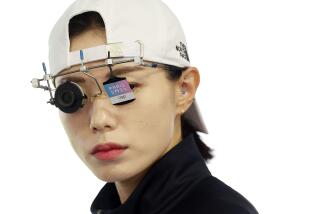KARI SWENSON : A Year After Ordeal, Biathlete Aims for Another World Medal
BOZEMAN, Mont. — Kari Swenson, the Montana markswoman and skier seriously wounded last year in a kidnaping by father-son “mountain men,” says she is frustrated by continuing pain and a sport that seems to ignore women’s abilities.
Swenson, 23, a six-time member of the U.S. national women’s biathlon team, has spent the past year recovering from her ordeal. In an interview with the Associated Press, she said she would compete only one more season in hopes of leaving world biathlon competition near the top of the field.
“I love biathlon,” she said of the sport that combines shooting and cross-country skiing. “I’d like to do it the rest of my life, but you really can’t go anywhere with it.” She plans eventually to enter veterinary school.
Swenson, who finished fifth at last year’s world championships at Chamonoix, France, was ripped from her athletic career July 15 while on a training run in the mountains of southwestern Montana.
She was kidnaped by two wilderness-dwelling men seeking companionship, and the following day she was wounded in the chest when two searchers discovered the camp where she was being held. One searcher was killed, and a highly publicized hunt for the men ensued.
Five months later, father and son Don and Dan Nichols were captured and charged with the abduction and shootings. Dan, 20, was convicted of kidnaping and assault; his 54-year-old father, who admitted his role in the kidnapping at his son’s trial, is scheduled to stand trial next month. Swenson declined to discuss her abduction.
Swenson said the biathlon was not a childhood goal. She began downhill skiing at age 4 and moved on to cross-country in junior high school.
“I got sick of waiting in lines” and disliked the pre-occupation of many downhill skiers with their wardrobe, she explained.
Her 22-year-old brother, Paul, was on the men’s national biathlon team in 1982 and competed at the world meet in Minsk, the Soviet Union, that year. She also has a sister, Johanna, 25. Her father, Robert, is head of the Montana State University physics department, and Jan, her mother, is a nurse with the university health service.
At home on skis, Swenson was introduced to the biathlon through exhibitions at junior ski championships and first participated in 1977 at age 15.
“I hadn’t done any shooting before; I just aimed and fired,” she recalled. “It added a whole new element to the sport. It was exciting, intriguing.”
Actual competition came two years later when a national race was held near Bozeman. By 1980, she was attending training camps. “They started showing more interest in the women for a change and were interested in developing a national women’s team,” she said.
Back in Bozeman, she practiced shooting with a used .22-caliber rifle. For the next five years, she competed in the national championships and earned a spot on the women’s team.
But it wasn’t until 1984 that she and several other American women were given a chance to compete internationally. Swenson claimed the second spot on the four-member U.S. team and captured fifth behind four Soviet women in the 10-kilometer race at the world championships--the first time an American woman had won a medal in international Nordic competition.
She finished 13th in the 5-kilometer race and was a member of the bronze medal-winning U.S. relay team.
Riding high from her success, Swenson maintained her rigorous seven-day-a-week training schedule of running, weightlifting, hiking and roller-skiing.
Her mountain run in July brought that to an abrupt end. The bullet that wounded her the next day struck her in the upper right chest, clipped her lung and exited her lower back.
By last November, she thought she was ready to resume serious training, but severe pain returned within weeks. “I overdid it,” she said. “I jumped into it too fast. I was so excited to be back on skis.”
Most of the pain came from the back wound. The U.S. Olympic Training Center fitted her with a battery-powered device designed to interrupt the pain with small electrical charges, but it helped for only two or three weeks.
“I couldn’t even sit without a lot of pain,” Swenson recalled.
Unable to ski, she concentrated on her shooting and competed in only one training race before the national championships in January.
“I went with the idea of just finishing--just to have fun,” she said.
But she did better than that, taking first in one 5,000-meter race and placing fourth in a 10,000-meter event. She finished fifth and sixth in two other races and won the third spot on the team.
In the 1985 world championships, Swenson finished 26th in the 10,000 meter and 25th in the 5,000.
“I was disappointed. I put too much stress on myself to do well,” she says. “But I had to look at it that I had been shot and had been through a lot. I couldn’t expect a lot from myself; the fact that I was there was enough.”
Now Swenson wants one more chance. She says she will shoot for another world medal next year but does not plan to hold out for an Olympic berth someday.
The women’s biathlon is not an Olympic sport, and Swenson doubts it will be in either 1988 or 1992. Olympic officials are reluctant to allow women into a sport viewed by most Europeans as very masculine, she said.
Swenson’s training season is just beginning. She expects it will be much as it was before last July 15, with one exception: “I only run in the mountains with lots of people or with dogs.”
More to Read
Go beyond the scoreboard
Get the latest on L.A.'s teams in the daily Sports Report newsletter.
You may occasionally receive promotional content from the Los Angeles Times.






